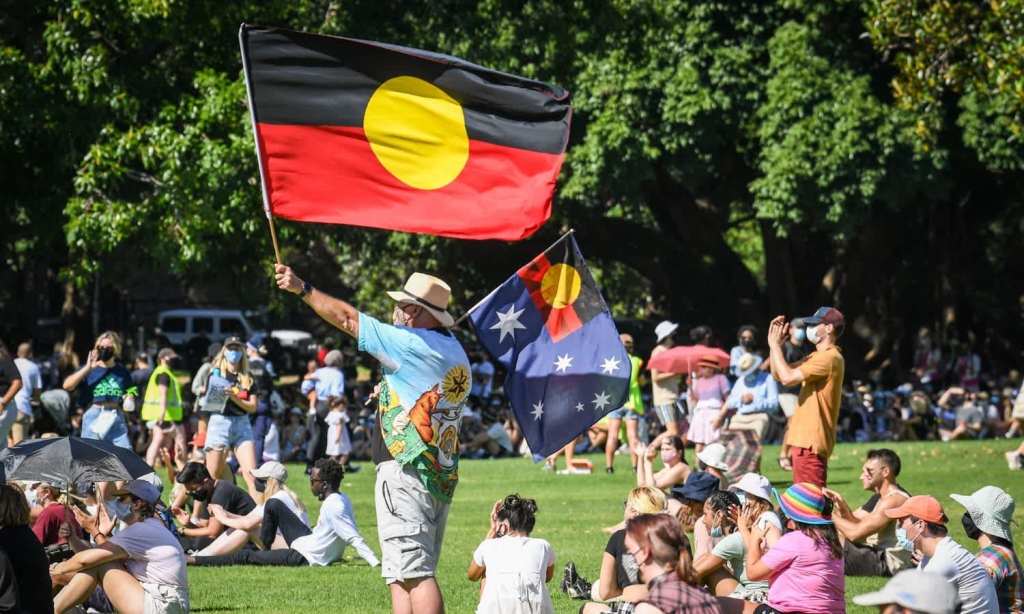To me, this day has always seemed gimmicky, rough, and just generally unnecessary — another excuse for Australians to do what they do best, which is to get drunk.
This day is a symbol of ignorance, laziness, selfishness and abuse of power. It’s celebrated without proper knowledge of what this day really means. So then, why does it still exist?
In truth, it doesn’t matter what date we “celebrate”. Modern Australia is built on genocide and is therefore absolutely no cause for celebration. Why pretend everything is okay for a day when First Nations people are the oldest surviving culture in the world and that in itself isn’t celebrated or acknowledged?
Although I am fully aware that I live on stolen land, sometimes the concept of what really happened overwhelms me. I don’t feel the weight of this truth to its full extent because I was brought up ignorant of my own privilege and how I got it.
I remember being taught about First Nation cultures in primary school, learning about their art, learning symbols and stories and beliefs within this culture that felt so beautiful but so far away from the life I lived and the culture that surrounded me.
During these lessons, no one ever showed us what was taken away. There was no clear communication on the violation that white people imposed on the Indigenous peoples upon the land that they had owned for centuries.
Sure, we watched Rabbit Proof Fence, but that film only shows a Westernised portion of the racial abuse, the cultural disrespect, the white supremacy, and the abuse of power that went on back then and continues through today.
A few years back, I sat down with a friend of mine; a First Nations woman. I asked her about the hype around the 26th and how she’s felt about it throughout her life.
She said she didn’t know how to talk about it politely. I said that was okay.
“It’s usually not okay,” she replied. “Until it gets close to January 26 and it’s topical, it’s not okay for me to be angry or to even talk about my intergenerational trauma but now everyone wants an explanation.”
And she’s totally right.
The emotional trauma and intellectual labour of constantly explaining something that we all know happened, just because we’re afraid to have political opinions aren’t free, it’s taxing and exhausting.
There are endless resources that are coming directly from the source, intended to be read by a diverse audience, yet we go and we ask and we make them re-live it for our benefit.
This was a big lesson for me.
Invasion Day is not my trauma and I will never truly understand what her life has been like growing up as a First Nations woman in modern Australia.
I don’t deserve the explanation that the world has been suppressing for so long, just because it’s the 26th and I want to write an article about what the f**k is going on.
All I know is, changing the date isn’t enough. The date needs to be abolished and many of us need to understand what truly happened in 1788 and continues to filter throughout our society today.
For more information, here is a list of resources that I have found useful and my hope is that you find them useful also.
Terra Nullius
This is an incredible debut from a striking new Australian Aboriginal voice to listen to on audiobook.
“This is not Australia as we know it. This is not the Australia of our history. This Terra Nullius is something new, but all too familiar.”
ABC Education
ABC Education is ABC’s free online education resource developed to support us through the topics and cultures we want to learn more about.
Reconciliation Australia
Reconciliation Australia is a non-government, not-for-profit foundation established in January 2001 to promote a continuing national focus for reconciliation between Indigenous and non-Indigenous Australians.
Discover Discomfort
Discover Discomfort is on a mission is to connect you with people from different backgrounds through immersive educational experiences.
Related: Know Better, Do Better: The Best Aussie Podcasts to Educate Yourself on Indigenous History
Related: Facts You Should Know About Our Indigenous History for Invasion Day







